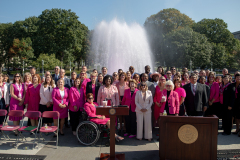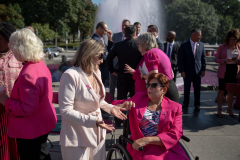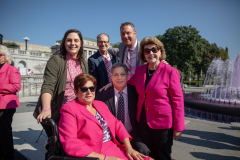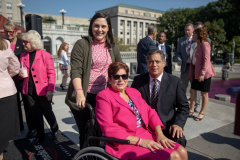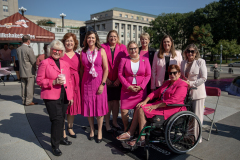October is
Breast Cancer Awareness Month
Breast Cancer Awareness Month is a public health campaign during October every year to increase awareness and to raise funds for researching the cause, prevention, diagnosis, treatment, and cure of the disease.
Breast cancer is one of the most common kinds of cancer in women; unfortunately, almost 1 in 8 women in the US will get breast cancer, but most women can survive if it is found and treated early. A mammogram – the screening test for breast cancer – can find breast cancer early, when it is easiest to treat.
Senate Bill 8 | Act 1 of 2023
Act 1 of 2023 (introduced as Senate Bill 8) is landmark, bipartisan legislation that will save countless lives. Passed unanimously in both legislative chambers and signed into law by Governor Josh Shapiro, the act will require insurers to cover preventive breast and ovarian cancer screenings for high-risk Pennsylvanians at no cost. The legislation covers the following:
Breast MRIs
Breast ultrasounds
BRCA-related genetic testing and counseling
Genetic testing for hereditary breast, ovarian, prostate, and other cancer syndromes
Supplemental breast screenings
If you have questions about Act 1, including if you qualify as high-risk and are covered by the new law, you can learn more here.

Facts and Stats
Know the symptoms.
New lump in the breast or underarm (armpit)
Thickening or swelling of part of the breast
Irritation or dimpling of breast skin
Redness or flaky skin in the nipple area or the breast
Pulling in of the nipple or pain in the nipple area
Nipple discharge other than breast milk, including blood
Any change in the size or the shape of the breast Pain in any area of the breast
I need a mammogram
If you are between the ages of 40 and 64, you may qualify for a screening mammogram, clinical breast exam and Pap test through the Pennsylvania Breast & Cervical Cancer Early Detection Program (PA-BCCEDP). Free services for those meeting the eligibility standards include:
- Mammograms;
- Pap and HPV tests; and
- Follow-up diagnostic tests for abnormal screening results
You can learn more about eligibility requirements on the PA Department of Health’s website or by calling 215-985-3300.
I don’t have insurance and I need treatment
If breast or cervical cancer or a precancerous condition is detected through the PA-BCCEDP, you may be eligible for free treatment through the Department of Human Services (DHS) – Breast and Cervical Cancer Prevention and Treatment Program (BCCPT). Eligibility for BCCPT is determined by DHS.
For specific information visit the BCCPT website.
I need help paying my prescriptions
Needy Meds is a nonprofit information service devoted to helping people in need find assistance programs to help them afford their medications and costs related to health care. Simply enter the name of your prescription medication in the search line and all available programs will be shown. For more information, visit the Needy Meds web page.
Pennsylvania’s prescription assistance programs for older adults, PACE and PACENET, offer low-cost prescription medication to qualified residents, age 65 and older. For more information, call 1-800-225-7223 or visit the PA Department of Aging website.
More information about available programs and options can be found on the American Cancer Society website.
I need help with my co-pays
Patient Advocate Foundation’s Co-Pay Relief Program offers assistance if your income is restricted to 400% of the poverty level. For more information, click here or call 866-512-3861.
Cancer Care Co-Payment Assistance Foundation, offers assistance for co-payment of prescriptions. For more information, click here or call 866-55-COPAY.
I have questions about what is covered under my health insurance
The PBCC’s guidebook “Breast Cancer: Covered or Not?” can be downloaded for free and was created to answer many of your questions, including what insurers are required to cover. You may appeal any denial of coverage from your insurer, and the guidebook provides sample letters.
The Pennsylvania Insurance Department answers insurance-related questions and hears complaints. Reach them on their automated toll-free hotline at 877-881-6388 or via online form.
In 2020, Governor Tom Wolf signed the PA Breast Cancer Coalition’s life-saving breast cancer screening legislation for women across the commonwealth. Senate Bill 595 requires insurers to cover breast MRIs and ultrasounds for women with very dense breasts and other high-risk factors for breast cancer. Under the new law, the patient may be responsible for costs such as co-pays, co-insurance and/or deductibles based on the individual’s health insurance policy regulated under Pennsylvania law. Each patient is advised to contact her insurer to determine what costs the insured would be responsible for prior to receiving the MRI and/or ultrasound.
I need financial assistance
Below is a list of organizations that offer financial assistance for patients and survivors:
- Susan G. Komen® offers the Komen Treatment Assistance Program to eligible, underserved individuals who are actively undergoing breast cancer treatment. Visit their website for more detail.
- CancerCare provides limited financial assistance for homecare, childcare and transportation. Click here or call 800-813-HOPE for details.
- The Pink Fund provides 90-day help with non-medical cost-of-living expenses for patient in active treatment.
- Pink Daisy Project, (for women under 45 only) offers financial help by providing grocery, restaurant and gas gift cards.
- The Journey Foundation, Inc. provides financial assistance with rent, mortgage and utilities. All recipients must be in active treatment for cancer. To apply, click
- Ta-Ta Rebels, Inc. covers out-of-pocket expenses for breast cancer survivors no longer in treatment.
I need a hat, wig or prostheses
There are many organizations that provide information and free options for women who would like to begin wearing a wig or head piece during their cancer treatment. Below is a list of some available resources:
- Hairs 2 U Wig Bank’s mission is to assist uninsured and underinsured women and children affected by illnesses that cause hair loss. Learn more on their website.
- The Cancer Center Boutique at the Perelman Center for Advanced Medicine offers products and services designed for the unique needs of female cancer patients.
- Wigs and Wishes encourages those in need of a wig to use the official Wigs & Wishes map to locate a salon closest them. They provide free wigs through various salons across the globe.
- Pink Heart Funds offers free wigs, post-mastectomy bras and prostheses (prescription required). For more information, click here or call 228-575-8299.
- Sparkle My Head Scarves offers beautiful head scarves (with a little bling!) on its website. Finished with treatment? Take part in the “Pass on the Sparkle” program by donating your gently used head scarf to be used in their free Friends Like Me care packages for newly diagnosed women. Click here for more information.
- In the Pittsburgh area, within 412 and 724 area codes, Hair Peace Charities offers $200 for women and girls in the Western PA region to purchase a wig when insurance does not help them. Contact them at hairpeace.org or 412-327-5177. Some, but not all, insurance policies cover the cost of wigs if the request is from a physician and worded as a “cranial prosthesis.”
I need legal advice about access to programs
The PA Health Law Project offers advice and advocacy on access to health care for low-income consumers, the elderly, and persons with disabilities. Contact them at www.phlp.org or 1-800-274-3258.
I’m worried about keeping my job
The Family Medical Leave Act (FMLA) applies to taking care of yourself as well as others. To qualify, your place of employment must have 50 or more employees and you must have worked there for at least 12 consecutive months. The act requires your employer to provide 12 workweeks of unpaid leave time. Details are on the Department of Labor website.
I need transportation to treatment
- Road To Recovery is an American Cancer Society program that provides transportation to and from treatment for people with cancer. For more information, call 1-800-227-2345.
- Angel Flight East offers air travel to distant cities for medical treatment. Patients must be able to board an aircraft and travel in a single or twin-engine plane. For details, visit the website here or call 610-940-1600.
- Patient Airlift Service provides free volunteer medical flights. Patients assume the cost of ground transportation at destination and departure locations. Find more information here or call 631-694-7257.





